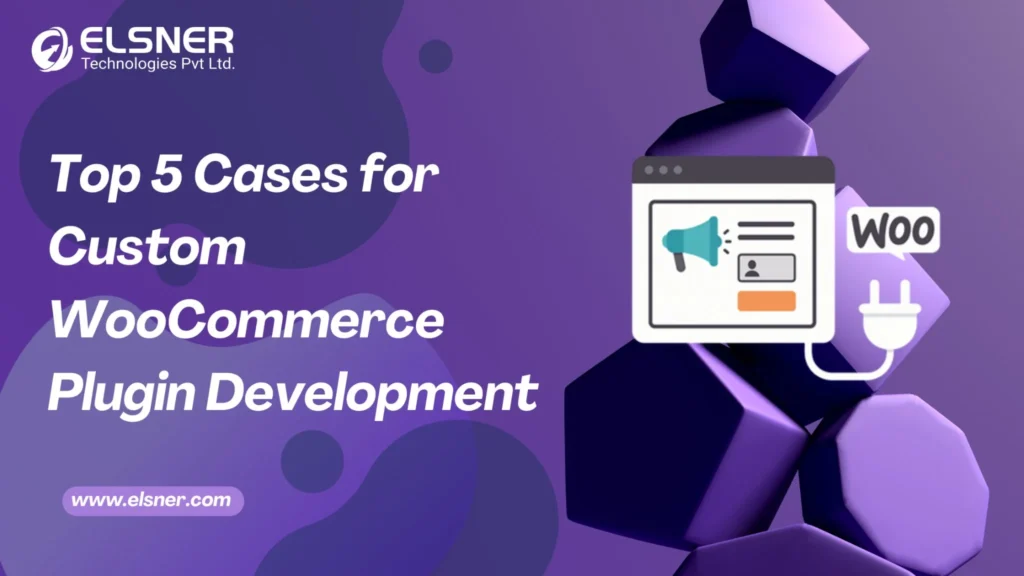Did you know that a vast majority of online retailers add custom extensions to their store within the first year? That is because many WooCommerce setups outgrow standard themes fast.
As your WooCommerce store evolves, so do your challenges. What worked during the launch phase may now feel like a roadblock—slowing down operations or limiting customer experience. That’s when generic plugins start showing their cracks.
This blog explains why businesses turn to WooCommerce development services and engage a WooCommerce website developer like Elsner when standard plugins no longer meet unique needs.
You will learn five real‑world cases where custom plugin development drives efficiency, revenue, and growth. Let’s dig in:
Why Off-the-Shelf Plugins Stop Working Over Time?
Most WooCommerce stores start with generic plugins, but those only take you so far. As your product catalog, customer base, or operations grow, gaps start to appear.
From mismatched billing logic to missing automation, the limitations add friction. That’s when businesses turn to custom WooCommerce plugin development to build tools tailored to their workflows.
Real-World Triggers for Custom WooCommerce Plugin Development
Now, let’s explore five real-world cases where this approach unlocked real results: better performance, streamlined operations, and scalable revenue:
1. Complex Subscription & Recurring Billing Logic
Subscription models are no longer one-size-fits-all. Whether you’re selling digital content, physical kits, or service bundles, your billing logic might involve:
- Free trials followed by paid upgrades
- Usage-based tiers with overage charges
- Family or group accounts sharing limits
- Mid-cycle upgrades/downgrades
- Auto-renewals with exceptions (e.g., skip a month)
Unfortunately, most commercial subscription plugins on the WooCommerce marketplace don’t support this level of granularity. You might end up stitching together multiple tools, leading to sync issues, billing errors, and user confusion.
Custom Plugin Advantage:
A WooCommerce development company can build a plugin that mirrors your subscription lifecycle exactly. From conditional renewals to precise invoice generation, the billing flow becomes both automated and reliable, benefiting finance, operations, and CX teams.
Use case:
A meditation app offering tiered content access and monthly kits needed logic for paused subscriptions during travel. A custom plugin built by a WooCommerce website developer saved 25+ support tickets per week by automating skips and resuming billing without errors.
2. Advanced B2B Pricing & Account Rules
If you sell to businesses, you already know WooCommerce isn’t built with B2B-first thinking. Business clients typically expect:
- Personalized pricing
- Net payment terms (e.g., Net 15, Net 30)
- Purchase order submission
- Tiered approval workflows
- Catalog visibility based on role or location
Many B2B brands try to get by using third-party B2B plugins—only to hit a wall when scaling. That’s when they hire WooCommerce expert developers to build features like:
- Custom dashboards for buyers and procurement officers
- Dynamic pricing rules based on contract or purchase history
- Auto-generated pro forma invoices or GST-compliant receipts
- Private product catalogs with login-based restrictions
Why it matters:
Custom B2B workflows reduce friction for repeat orders and large-volume buyers. More importantly, they create automated buying flows, which shorten sales cycles and reduce human intervention.
Use case:
An office supplies wholesaler needed customer-specific pricing and role-based access to safety stock. They hired a WooCommerce certified developer to build a plugin that connected role-based pricing with real-time inventory data—driving a 30% increase in repeat B2B orders.
3. Seamless ERP & CRM Integrations
For mid-size and enterprise WooCommerce users, syncing order data with ERPs or CRMs like SAP, NetSuite, Zoho, or Salesforce becomes mission-critical. Yet, this is where many businesses hit a major roadblock.
Most third-party connectors lack:
- Field mapping flexibility (e.g., mapping WooCommerce “Shipping Method” to a custom field in NetSuite)
- Error handling or retry logic
- Batch sync optimization to avoid API rate limits
- Granular sync triggers (e.g., only sync when an invoice is paid)
A custom WooCommerce plugin bridges these gaps by offering logic that understands both systems and speaks their “language.”
Custom Plugin Features:
- One-way or two-way syncs between systems
- Scheduled updates with batching and prioritization
- Smart fallback for when external systems go down
- Built-in error logging and alert notifications
Use case:
A US-based fashion brand needed real-time inventory sync between WooCommerce and NetSuite across 3 warehouses. They chose to hire WooCommerce plugin development services to build a robust sync logic with warehouse prioritization and error alerts. Manual reconciliation time dropped by 85%.
4. Custom Checkout or Payment Flow
Your checkout process is where conversion either happens—or drops off. Businesses often require workflows that WooCommerce’s standard checkout can’t support. Examples include:
- Deposits or split payments (e.g., 30% upfront, 70% later)
- Conditional fields (e.g., show “business license number” only for wholesale roles)
- Multi-step checkout wizards with address validation
- Mandatory file uploads, purchase orders, or terms acceptance
- Delayed or offline payment methods require admin approval
These scenarios require a checkout plugin that’s deeply integrated into your business rules.
Custom Plugin Impact:
A WooCommerce development company can build a checkout plugin that adapts to different user types, cart conditions, or payment requirements—without hurting performance or UX.
Use case:
A high-ticket furniture brand wanted buyers to pay 20% upfront, with the remainder on delivery. Standard payment plugins didn’t support this split logic. With a custom checkout plugin, built by a WooCommerce expert developer, they increased conversion on high-ticket items by 40%.
5. Region-Specific Features & Legal Compliance
Selling across regions—especially in regulated industries—requires airtight logic around:
- Location-based product visibility
- Country/state-specific tax rules
- Age verification and compliance prompts
- Shipping method restrictions based on destination
- Custom duties or localized invoices
Most WooCommerce stores rely on plugins like tax calculators or shipping zones. But what happens when you sell:
- Alcohol (age-gated)
- Vapes (restricted by country)
- Digital goods (VATMOSS and digital taxes)
- Medicines or supplements (with storage or age limits)
Custom Plugin Functionality:
- IP-based or billing-address-based logic
- Popups or redirects based on jurisdiction
- Hard-coded tax compliance for B2C and B2B variations
- Backend rules for disabling shipping to banned zones
Use case:
A supplement store operating in the US and EU needed GDPR consent capture, VAT compliance, and region-specific terms acceptance. They hired WooCommerce certified developers to build a plugin that enforced these behind the scenes, ensuring smooth checkouts without legal lapses.
At-a-Glance: When to Use Custom WooCommerce Plugins?
| Business Requirement | Off-the-Shelf Plugin | Custom Plugin (Built by WooCommerce Expert) |
| Multi-tiered subscription billing | Not supported | Fully flexible billing logic |
| B2B pricing & role-based visibility | Workarounds needed | Streamlined and scalable |
| ERP/CRM sync with field mapping | Often fails | Tailored with logging and retries |
| Custom checkout or split payments | Limited | Supports all use cases |
| Region-based tax, shipping & compliance | Not reliable | Built to match legal frameworks |
Many businesses choose to hire WooCommerce developers to manage these complexities correctly.
When to Choose Custom Plugin Development?
Here are common business cases where an off-the-shelf plugin just won’t cut it:
| Business Case | Why a Plug-in Is Needed |
| Subscription products | Standard plugins lack flexible billing rules |
| B2B pricing and account logic | Wholesale pricing, catalogs, zero checkout |
| ERP / CRM integration | Sync automation and error handling are needed |
| Custom checkout flow | Unique fields, payment steps, and conditional logic |
| Regional compliance or logic | Automated compliance, localized rules |
Custom plugins ensure your store runs the way your business works—not the other way around. If that’s your goal, it’s time to hire a WooCommerce theme developer who can build features tailored to your exact needs.
Why do Brands Choose to Engage Elsner for WooCommerce Plugin Development?
Elsner is a respected WooCommerce development company for brands facing complex business needs. Retailers rely on them as they advance into enterprise-grade operations.
- They employ WooCommerce-certified developers with deep plugin architecture expertise
- They build custom plugins under solid testing practices
- They deliver code that scales across stores, ERP systems, and custom checkout flows
- They understand business logic, not just code—and that’s key to success
If you’re looking to hire WooCommerce expert developers who can tailor plugins to your unique workflow, customer segment, or market, Elsner is a proven partner.
Final Thoughts: Custom WooCommerce Plugins Are a Growth Lever
Off-the-shelf plugins are fine when you’re starting. But as your store grows, complexity increases. At some point, custom plugins stop being a luxury and become a necessity.
When you hire dedicated WooCommerce developers through a trusted firm like Elsner, you’re not just adding a plugin. You’re building business logic into your store. That logic keeps your systems lean, your operations efficient, and your customers happy.
Ready to Build What Your Store Truly Needs?
If you’re at a point where plugin limitations are holding back growth, it’s time to bring in experts.
Hire WooCommerce plugin development services that understand both code and commerce.
Talk to Elsner—and build plugins that scale with your ambitions.
Explore related articles to deepen your understanding before you go.






